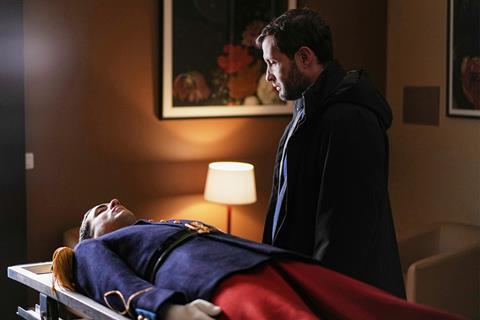A military hazing ritual turns deadly in Rachid Hami’s intensely personal drama

Dir: Rachid Hami. France/Taipei. 2022. 113 mins.
There’s an intensely autobiographical backdrop to Rachid Hami’s earnest drama about grief, family and honour, which sees him return to the Venice Film Festival in the Orizzonti sidebar after his previous film, Orchestra Class, screened out of competition in 2017. The actor-turned-writer/director’s own brother Jallal died in a similar hazing ritual while training at Saint-Cyr Military Academy to that which triggers the trajectory of For My Country, causing personal and political ripples that spread through the film.
The tenor of the film tends towards the dour
Hami and his co-writer Ollivier Pourriol take an understandably sombre approach to the story, which moves from France to Algeria and Taiwan’s Taipei across three different time periods and several languages. But the film is so sprawling that its slow-burn emotions often lose much of their heat. After Venice, For My Country is likely to hold most appeal to further festivals, while the presence of stars including Lubna Azabal (Incendies), Shain Boumedine (Mektoub, My Love) and Karim Leklou (The World Is Yours) may also help it catch the eye of distributors in Francophone countries.
Boumedine plays the idealistic young Aissa, who we meet moments before the middle-of-the-night “bahutage” — a hazing ritual that looks like an extreme Army drill — leads to his death. As his mother (Azabal), older brother Ismael (Leklou) and their extended family find themselves grappling with the authorities over his right to be buried in a military cemetery, despite not having fallen in combat, the situation is further complicated by the reappearance of the men’s estranged father (Samir Guesmi).
This last turn of events leads Ismael to reconsider two painful episodes from his past: one as a child surrounding the circumstances in which his mother took them from Algeria, and a second which sees him pay a fractious visit to his brother in Taipei, where the younger man was studying, two years before his death.
Hami has given himself a lot to contend with, not just in terms of blending the political with the personal but also the interplay between action in the present and the flashbacks. As a result, he struggles to find a balance. Frequently, he spirits us off right as an idea or an emotion feels as though it is just getting going — such as the tensions between Ismael and his father, or the complex machinations regarding the burial which see the family gain an unlikely ally.
The measured approach, not just in terms of the story but the camerawork from Jerome Almeras (In The House, Human Capital), which feels quite stand-offish throughout, also means the tenor of the film tends towards the dour. This is not helped by moments in Taipei where English is used as a common language, resulting in the sentiments being expressed lacking natural cadence.
The director’s strength lies in his depiction of the domestic, and the way he integrates the family’s faith into the film helps to root his story in a firm reality. The actors also deserve plaudits for bringing additional intensity to scenes when required, particularly Azabal, who lets the mother’s grief manifest itself as much through her physical reaction as through the script. Given how invigorating the scenes are when the director does permit a bit more energy — a show of rebellion against the boy’s father as a child, a stop-off at a club, or a moment of shared connection between the brothers as they play air hockey — it’s only a pity he doesn’t do it more frequently.
Production companies: Mizar Films, Ma Studios
International sales: mk2 films, quentin.bohanna@mk2.com
Producers: Nicolas Mauvernay, Amy Ma, Tien-Tsung Ma
Screenplay: Rachid Hami, Ollivier Pourriol
Cinematography: Jerome Almeras
Production design: Yann Megard
Editing: Joelle Hache
Music: Dan Levy
Main cast: Karim Leklou, Shain Boumedine, Lubna Azabal, Samir Guesmi, Laurent Lafitte, Vivian Sung
























